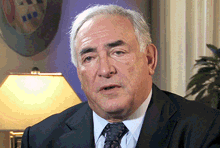
Typical street scene in Santa Ana, El Salvador. (Photo: iStock)
IMF Survey: Focus Now on Applying Stimulus, IMF Says Ahead of G-7
February 12, 2009
- Governments must now carry out their stimulus plans, IMF says
- IMF head warns of protectionism "through the back door"
- Solutions to crisis must not be at expense of other economies
IMF head Dominique Strauss-Kahn said that advanced countries must now focus on getting their economies moving again by implementing the stimulus packages they have announced, as well as cleaning up their financial sectors.

Factory in Illinois, United States: global downturn is stalling growth, eroding jobs in advanced economies (photo: Chuck Berman/Chicago Tribune/MCT)
GLOBAL FINANCIAL CRISIS
U.S. Congressional leaders have agreed a stimulus package worth $789 billion, and countries in Europe and Asia have also taken steps to counter the global slowdown.
Speaking ahead of a trip to Rome to join a conference of the world's advanced economies, known as the Group of Seven (G-7), Strauss-Kahn said: "So the question is no more to convince the governments to move today, but for them to implement the policies they need to manage."
He warned of the dangers of protectionist solutions to the crisis, which started in mid-2007. "You may have protectionism coming through the back door, especially in the financial sector," he said.
He also outlined how IMF programs for crisis-hit countries differed from the past, and pointed to greater focus on assisting vulnerable groups through the development of social safety nets. Here is an edited transcript of his interview.
IMF Survey online: The financial crisis seems to be intensifying. Are we in the eye of the hurricane right now or is worse to come?
Strauss-Kahn: The problem is that the effect on the real economy, for the most part, is still to come. 2009 will certainly be a rather bad year for growth, not only for the advanced economies, but also for the emerging economies.
But there [are] signals, some signs of hope. Large stimulus packages have been implemented, especially in the United States—you will have seen the latest developments here in Washington and on Capitol Hill. The same is true, even if it's not on the same level, in most European countries, where some room was available for stimulus packages. Also, most governments have realized that they have to work on the financial sector—to restructure the financial sector and clean up bank balance sheets.
IMF Survey online: With dramatic job losses around the world, how serious is the risk of protectionist politics?
Strauss-Kahn: It's big. It's really big. Not traditional protectionism—increasing tariffs and things like that. Most governments have understood from lessons from the past that this did not work, and it even made things worse.
But you may have protectionism coming through the back door, especially in the financial sector. To give you an example, when governments provide some new resources or recapitalization of banks, they may add some comment saying that the money should stay at home. Or you may have in different stimulus packages some comment or amendment saying that this money also should be used to buy national products, and these kinds of things. So this kind of protectionism may come back.
So the risk of a "beggar your neighbor" policy is still high, and I think it is part of our job to explain that in no way in a global crisis [should there] be a domestic or national solution: we have to find a global response.
IMF Survey online: The IMF says that governments have done a lot already but that they haven't achieved a decisive breakthrough yet. What more should governments do to prevent a further downward spiral in the global economy?
Strauss-Kahn: A big change, especially the big change during the fall, was that most governments, including the United States, Japan, the European countries, but also others, did not realize that what the IMF had been claiming for months—that we needed a stimulus package at the global level, and at the same time that there was no solution but comprehensive action on the financial sector. They did not realize that it was true and that they had to act. Probably the G-20 meeting on November 15 here in Washington was the point when heads of states and governments became more explicit about it.
Now, it takes a lot of time in different countries, depending on the national democratic processes and other reasons, to implement this. It is true for the stimulus packages, and even more so for restructuring of the financial, and especially the banking sector. So the question is no more to convince the governments to move today, but for them to implement the policies they need to manage.
I have just come from a tour in Europe and Asia, and I am flying to the G-7 meeting in Rome, and the message from the Fund is twofold: First, what you prepared is OK, in most cases, so just do it!
Second, the crisis has now hit hard in the emerging countries, and the financing we have [provided] for the emerging countries is very important. It may come to us if it goes badly in those countries because of the global economy—because we are in a global crisis—so you have to take care not only of what is happening in your own economy, or in the regional economy, but you, the leaders, need to take care of the global economy. So these two messages are very important today.
IMF Survey online: Some critics are already saying, as in the Asian crisis, that the IMF is making things worse by suggesting that governments raise interest rates and cut spending. Are IMF programs different from before?
Strauss-Kahn: I'm not sure I agree with the premise of your question. Yes, the IMF made mistakes, sometimes even big mistakes. But please remember that we were trying to help economies that were in trouble. That's what we are here for! If countries never ran into problems, there would be no need for the IMF.
But when no one wants your currency, then you have no choice but to raise interest rates to make it more attractive. And when you are running a large current account deficit, you must take steps to reduce it. You need to find additional resources—including by borrowing from the Fund—and to balance it with cuts to the budget.
So when the IMF is called in it is because a country has problems, and it a bit naïve to believe that those problems can be resolved without pain. In fact, without the help of the IMF, the solution in the country will be even more painful for the people.
That said, the world has changed, and this crisis differs from previous crises, so we have had to adapt our policies. What the IMF has tried to do is to focus the conditionality of our loans on the core problems we need to fix. In the past there were many conditions which were certainly good for the country but not directly linked to the most pressing problems at hand.

Strauss-Kahn: "What the IMF has tried to do is to focus the conditionality of our loans on the core problems we need to fix" (IMF photo)
When you look at the number of conditions in the IMF's most recent programs, they have dropped by 30-40 percent, and are mainly focused on the financial sector or the fiscal deficit.
Let me add one more point. In this crisis, everyone in the country may be hit, but some will be hit harder than others. I believe the Fund has to take care of the most vulnerable in society. And that is why developing safety nets, even in a crisis, is very important.
Let's take the example of Pakistan. We have a program with Pakistan, where the Fund has agreed to a dedicated amount to be spent on programs that will be implemented—with the help of the World Bank—to help the most vulnerable people.
What is true for Pakistan is also true for other countries, where we have to take into account that part of the population may be very hard hit by the crisis. We are doing this not only because we want to help people, but also because such policies will help ensure ownership of the program. Ownership is vital to the success of any IMF-supported program, and to have ownership we need to show that the program takes care of the needs of the entire population, including those who are most vulnerable.
Comments on this article should be sent to imfsurvey@imf.org







